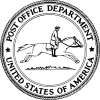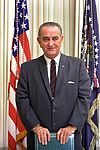W. Marvin Watson
Marvin Watson | |
|---|---|
 | |
| United States Postmaster General | |
| In office April 26, 1968 – January 20, 1969 | |
| President | Lyndon B. Johnson |
| Preceded by | Larry O'Brien |
| Succeeded by | Winton M. Blount |
| White House Appointments Secretary | |
| In office November 22, 1963 – April 26, 1968 | |
| President | Lyndon B. Johnson |
| Preceded by | Kenneth O'Donnell |
| Succeeded by | James Robert Jones |
| Personal details | |
| Born | June 6, 1924 Oakhurst, Texas, U.S. |
| Political party | Democratic Party |
| Alma mater | Baylor University |
| Military service | |
| Allegiance | |
| Branch/service | |
| Battles/wars | World War II |
William Marvin Watson (born June 6, 1924) was an advisor to U.S. President Lyndon B. Johnson and was Postmaster General from April 26, 1968 to January 20, 1969.[1]
Life and career
Watson was born in Oakhurst, Texas, and attended Baylor University in Waco, Texas, getting a scholarship as a musician. He entered the United States Marine Corps during World War II and saw action in the Pacific campaign during the later stage of the war. He began working for Johnson during the 1948 primary campaign for the Democratic nomination to run for the United States Senate. At that time, there was no noteworthy Republican Party in Texas, so the primary would effectively decide the election.
Watson continued being active in local politics as a "Johnson Man," rising to become the head of the Democratic Party in Texas. In 1960, he both helped organize the Kennedy/Johnson campaign in Texas while also working directly for Johnson as an aide while campaigning across the United States. During Johnson's years as both a Senator as well as Vice-President, he repeatedly asked Watson to join his staff, but Watson declined, preferring the freedom of remaining an independent adviser to LBJ, rather than an employee.
Johnson called upon Watson to help organize the 1964 Democratic Convention in Atlantic City, New Jersey. Watson found it necessary to remove many Kennedy family loyalists from the convention staff, as he became convinced that they were working to either force Johnson to accept Robert Kennedy as his running mate, or else stampede the delegates to have RFK nominated for the presidency instead of Johnson.
Watson became the White House Chief of Staff in-all-but-title as White House Appointments Secretary to President Johnson in 1965, helping to coordinate passage of much of the Great Society domestic agenda.[2] In this position, his workday frequently began shortly after 6:00 in the morning, and he routinely didn't return home for the day until midnight or later; even during his off hours, he remained on call, and quite often found himself back at his desk in the White House on Sundays in order to deal with sudden issues. He was appointed Postmaster General in 1968, and is now the last surviving cabinet-level Postmaster General.
After the end of the Johnson administration in 1969, Watson became an official with Occidental Petroleum, working with Armand Hammer. He had been offered the U.S. ambassadorship to Australia by Richard Nixon, but declined so as to be able to spend more time with his family.
He delivered a heartfelt eulogy at Johnson's state funeral in January 1973, emphasizing Johnson's obsessive dedication to the betterment of America.
He served as the president of Dallas Baptist College (now Dallas Baptist University) from 1979 to 1987.
Further reading
- W. Marvin Watson & Sherwin Markman. Chief of Staff: Lyndon Johnson and His Presidency. Thomas Dunne Books, 2004. ISBN 0-312-28504-3
References
- ^ Miller Center Archived June 26, 2013, at the Wayback Machine
- ^ A Time to Remember
External links
- 1924 births
- American military personnel of World War II
- Baylor University alumni
- Businesspeople from Texas
- Living people
- Lyndon B. Johnson administration cabinet members
- People from San Jacinto County, Texas
- Texas Democrats
- United States Marines
- United States Postmasters General
- White House Chiefs of Staff
- Writers from Texas



